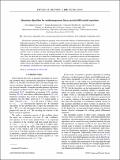| dc.contributor.author | Arrazola, Juan Miguel | |
| dc.contributor.author | Kalajdzievski, Timjan | |
| dc.contributor.author | Weedbrook, Christian | |
| dc.contributor.author | Lloyd, Seth | |
| dc.date.accessioned | 2021-11-01T14:39:50Z | |
| dc.date.available | 2021-11-01T14:39:50Z | |
| dc.date.issued | 2019-09-04 | |
| dc.identifier.uri | https://hdl.handle.net/1721.1/136954 | |
| dc.description.abstract | We describe a quantum algorithm for preparing states that encode solutions of nonhomogeneous linear partial differential equations. The algorithm is a continuous-variable version of matrix inversion: it efficiently inverts differential operators that are polynomials in the variables and their partial derivatives. The output is a quantum state whose wave function is proportional to a specific solution of the nonhomogeneous differential equation, which can be measured to reveal features of the solution. The algorithm consists of three stages: preparing fixed resource states in ancillary systems, performing Hamiltonian simulation, and measuring the ancilla systems. The algorithm can be carried out using standard methods for gate decompositions, but we improve this in two ways. First, we show that for a wide class of differential operators, it is possible to derive exact decompositions for the gates employed in Hamiltonian simulation. This avoids the need for costly commutator approximations, reducing gate counts by orders of magnitude. Additionally, we employ methods from machine learning to find explicit circuits that prepare the required resource states. We conclude by studying two example applications of the algorithm: solving Poisson's equation in electrostatics and performing one-dimensional integration. | en_US |
| dc.publisher | American Physical Society | en_US |
| dc.relation.isversionof | http://dx.doi.org/10.1103/PhysRevA.100.032306 | en_US |
| dc.rights | Article is made available in accordance with the publisher's policy and may be subject to US copyright law. Please refer to the publisher's site for terms of use. | en_US |
| dc.source | American Physical Society | en_US |
| dc.title | Quantum algorithm for nonhomogeneous linear partial differential equations | en_US |
| dc.type | Article | en_US |
| dc.identifier.citation | Phys. Rev. A 100, 032306 (2019) | en_US |
| dc.contributor.department | Massachusetts Institute of Technology. Department of Mechanical Engineering | |
| dc.identifier.mitlicense | PUBLISHER_POLICY | |
| dc.identifier.mitlicense | PUBLISHER_POLICY | |
| dc.eprint.version | Final published version | en_US |
| dc.type.uri | http://purl.org/eprint/type/JournalArticle | en_US |
| eprint.status | http://purl.org/eprint/status/PeerReviewed | en_US |
| dc.date.updated | 2019-09-05T20:09:18Z | |
| dc.language.rfc3066 | en | |
| dc.rights.holder | American Physical Society | |
| dspace.date.submission | 2019-09-05T20:09:18Z | |
| mit.metadata.status | Authority Work and Publication Information Needed | |
